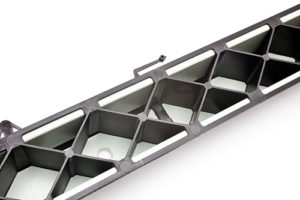Plastic / Metal Hybrid Technology

| Erlanger Träger made of steel with PA6 rips full-face joined by a bonding agent |
The development of weight-carrying hybrid structures consisting of a metallic insert and injection-molded polymer ribbing offers new, constructive opportunities for lightweight design and opens up areas of application that typically belong to fully metal-based materials like front ends, car roof cross members, etc. As such, the processing method In-Mold-Assembly (IMA) offers an outstanding cost-effectiveness in comparison to Post-Mold-Assembly (PMA) because parts leave the injection molding machine ready for the final assembly. The load transmission between the two dissimilar material classes typically occurs at junction points such as crimping and clinching via form and force fitting.
Due to the mix of materials, the need for novel joining methods is growing to better utilize ribbing and insert material and to attain further light weight potential. At the Institute for Polymer Technology full-faced joining methods for inline-processing are being investigated. Specimens of varying complexity (from the single ribbing to the hybrid carrier “Erlanger Träger”) are currently being employed for test purposes.
Dr.-Ing. Uta Rösel
Institute of Polymer Technology
Processing (Head of Department)
- Phone number: +49913185-71002
- Email: uta.ur.roesel@fau.de
